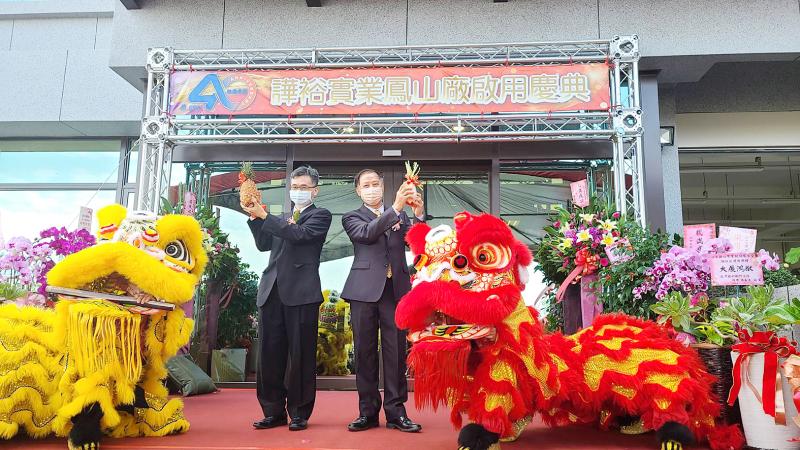Antenna manufacturer Wha Yu Industrial Co (譁裕實業) yesterday inaugurated its new NT$500 million (US$18 million) facility at the Fengshan Industrial Park (鳳山工業區) in Hsinchu County’s Hukou Township (湖口).
Wha Yu said the new plant would boost the ratio of products made in Taiwan to 50 percent of its total output next year, compared with 30 percent this year, with the remaining 70 percent coming from China.
In addition to antenna production, the new Fengshan plant would be used to manufacture surface-mount technology (SMT) products and electronics manufacturing services, it said.

Photo: Wang Yi-hung, Taipei Times
Wha Yu mainly supplies antennas for automotive radars, wireless networking and Internet of Things applications.
It has broken into the supply chain for low-orbit satellites in the US and received an MFi — Made for iPhone/iPad/iPod — production certification from Apple Inc to supply transmission lines, chargers, speakers and other accessories, Wha Yu president Chen Shih-chung (陳世忠) said.
Together with its partners, the company has also tapped into the base station market for low-orbit satellites, which could become a major revenue driver once the company ramps up production in the coming years, he added.
Wha Yu chairman Tsou Mi-fu (鄒宓富) said he expects the company’s gross margin to rise to about 30 percent from 20 percent now, supported by its new lineup of products.
While Taiwan has been aggressively pushing 5G networks, a big problem is 5G signals bouncing off buildings instead of penetrating them.
Better antennas, like those Wha Yu makes, offer a way to get around this problem, Tsou said.

Taiwan Semiconductor Manufacturing Co (TSMC, 台積電), the world’s biggest contract chipmaker, booked its first-ever profit from its Arizona subsidiary in the first half of this year, four years after operations began, a company financial statement showed. Wholly owned by TSMC, the Arizona unit contributed NT$4.52 billion (US$150.1 million) in net profit, compared with a loss of NT$4.34 billion a year earlier, the statement showed. The company attributed the turnaround to strong market demand and high factory utilization. The Arizona unit counts Apple Inc, Nvidia Corp and Advanced Micro Devices Inc among its major customers. The firm’s first fab in Arizona began high-volume production

VOTE OF CONFIDENCE: The Japanese company is adding Intel to an investment portfolio that includes artificial intelligence linchpins Nvidia Corp and TSMC Softbank Group Corp agreed to buy US$2 billion of Intel Corp stock, a surprise deal to shore up a struggling US name while boosting its own chip ambitions. The Japanese company, which is adding Intel to an investment portfolio that includes artificial intelligence (AI) linchpins Nvidia Corp and Taiwan Semiconductor Manufacturing Co (TSMC, 台積電), is to pay US$23 a share — a small discount to Intel’s last close. Shares of the US chipmaker, which would issue new stock to Softbank, surged more than 5 percent in after-hours trading. Softbank’s stock fell as much as 5.4 percent on Tuesday in Tokyo, its

The prices of gasoline and diesel at domestic fuel stations are to rise NT$0.1 and NT$0.4 per liter this week respectively, after international crude oil prices rose last week, CPC Corp, Taiwan (台灣中油) and Formosa Petrochemical Corp (台塑石化) announced yesterday. Effective today, gasoline prices at CPC and Formosa stations are to rise to NT$27.3, NT$28.8 and NT$30.8 per liter for 92, 95 and 98-octane unleaded gasoline respectively, the companies said in separate statements. The price of premium diesel is to rise to NT$26.2 per liter at CPC stations and NT$26 at Formosa pumps, they said. The announcements came after international crude oil prices

SETBACK: Apple’s India iPhone push has been disrupted after Foxconn recalled hundreds of Chinese engineers, amid Beijing’s attempts to curb tech transfers Apple Inc assembly partner Hon Hai Precision Industry Co (鴻海精密), also known internationally as Foxconn Technology Group (富士康科技集團), has recalled about 300 Chinese engineers from a factory in India, the latest setback for the iPhone maker’s push to rapidly expand in the country. The extraction of Chinese workers from the factory of Yuzhan Technology (India) Private Ltd, a Hon Hai component unit, in southern Tamil Nadu state, is the second such move in a few months. The company has started flying in Taiwanese engineers to replace staff leaving, people familiar with the matter said, asking not to be named, as the